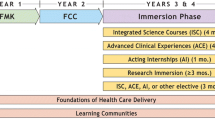Abstract
The Advanced Teaching in Gross Anatomy elective course is designed to help second-year students pursuing an anatomy master’s degree to develop expertise in teaching. A key innovation allows student educators (SEs) to develop core teaching competencies in an authentic classroom setting by offering the elective concurrently with a first-year graduate course in gross anatomy. Each curricular component targets one or more teaching competencies: content knowledge, learner-centeredness, interpersonal and communication skills, professionalism and role modeling, practice-based reflection, and systems-based practice. Readings, seminars, and interactive and application-based activities such as the development and delivery of a regional anatomy lecture with associated learning objectives and assessment tool, creation and delivery of an active learning review, and production of a teaching philosophy statement are used to introduce and apply evidence-based educational strategies, while also situating future educators within the larger systems of anatomy and medical education today. Iterative multi-source feedback and deliberate practice skills are modeled and applied throughout the elective. From 2014 to 2016, 11 SEs completed the elective; 82% returned pre- and post-course surveys. Self-reported confidence in eight educational skills significantly increased after the course (p < 0.01), demonstrating the educational impact of the elective. Data collected from teaching evaluations indicate the high quality of the lectures and active learning reviews by the SEs. The curriculum model could be easily adapted to train future educators at different levels of their career (i.e., master’s, doctoral, post-doctoral) across all sub-fields of anatomical sciences and other basic medical sciences. Widespread adoption of this model curriculum in science graduate program would expand the educational training available to future medical educators and over time, improve the quality of medical education.
Similar content being viewed by others
References
Leung W-C. Competency based medical training: review. BMJ. 2002;325(7366):693–5. https://doi.org/10.1136/bmj.325.7366.693.
Frank JR, Snell LS, Ten Cate O, Holmboe ES, Carraccio C, Swing SR, et al. Competency-based medical education: theory to practice. Med Teach. 2010;32(8):638–45. https://doi.org/10.3109/0142159X.2010.501190.
Srinivasan M, Li S-TT, Meyers FJ, Pratt DD, Collins JB, Braddock C, et al. “Teaching as a competency”: competencies for medical educators. Acad Med. 2011;86(10):1211–20. https://doi.org/10.1097/ACM.0b013e31822c5b9a.
Steinert Y, Mann K, Anderson B, Barnett BM, Centeno A, Naismith L, et al. A systematic review of faculty development initiatives designed to enhance teaching effectiveness: a 10-year update: BEME guide no. 40. Med Teach. 2016;38(8):769–86. https://doi.org/10.1080/0142159X.2016.1181851.
Teikan A, Harris I. Preparing health professions education leaders worldwide: a description of masters-level programs. Med Teach. 2012;34(1):52–8. https://doi.org/10.3109/0142159X.2011.599895.
Steinert Y. Faculty development: on becoming a medical educator. Med Teach. 2010;34(1):74–6.
Fitzgerald JT, Burkhardt JC, Kasten SJ, Mullan PB, Santen SA, Sheets KJ, et al. Assessment challenges in competency-based education: a case study in health professions education. Med Teach. 2016;38(5):482–90. https://doi.org/10.3109/0142159X.2015.1047754.
Cutting MF, Saks NS. Twelve tips for utilizing principles of learning to support medical education. Med Teach. 2012;34(1):20–4. https://doi.org/10.3109/0142159X.2011.558143.
Harden RM, Laidlaw JM, Be FAIR. To students: four principles that lead to more effective learning. Med Teach. 2013;35(1):27–31. https://doi.org/10.3109/0142159X.2012.732717.
Roediger HL, Butler AC. The critical role of retrieval practice in long-term retention. Trends Cogn Sci. 2011;15(1):20–7. https://doi.org/10.1016/j.tics.2010.09.003.
Miller GE. The assessment of clinical skills/competence/performance. Acad Med. 1990;65(9):S63–7. https://doi.org/10.1097/00001888-199009000-00045.
Nicol DJ, Macfarlane-Dick D. Formative assessment and self-regulated learning: a model and seven principles of good feedback practice. Stud High Educ. 2006;31(2):199–218. https://doi.org/10.1080/03075070600572090.
Ericsson KA. Deliberate practice and the acquisition and maintenance of expert performance in medicine and related domains. Acad Med. 2004;79(10):S70–81. https://doi.org/10.1097/00001888-200410001-00022.
Aronson L. Twelve tips for teaching reflection at all levels of medical education. Med Teach. 2001;33:200–5.
Kearns KD, Sullivan CS. Resources and practices to help graduate students and postdoctoral fellows write statements of teaching philosophy. Adv Physiol Educ. 2011;35(2):136–45. https://doi.org/10.1152/advan.00123.2010.
Kirkpatrick DL, Kirkpatrick JD, editors. Evaluating training programs: the four levels, 3rd edition. San Francisco, CA: Berrett-Koehler; 2006.
Harden RM, Crosby JRAMEE. Education guide no. 20: the good teacher is more than a lecturer—the twelve roles of the teacher. Med Teach. 2000;22(4):334–47.
Acknowledgments
Sincere thanks to the master’s students who have participated in the elective since 2014, and to the Modern Human Anatomy program for supporting the creation of this course offering. Thank you to the reviewers who provided thoughtful suggestions that have improved this paper.
Author information
Authors and Affiliations
Corresponding author
Ethics declarations
Conflict of Interest
The corresponding author states that there is no conflict of interest.
Electronic supplementary material
Online Resource 1
(DOCX 45 kb)
Rights and permissions
About this article
Cite this article
Royer, D.F. A Model Curriculum for Developing Teaching Competencies in Future Medical Educators. Med.Sci.Educ. 28, 89–100 (2018). https://doi.org/10.1007/s40670-017-0511-4
Published:
Issue Date:
DOI: https://doi.org/10.1007/s40670-017-0511-4




